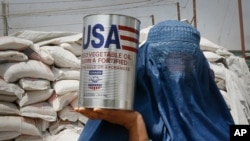A U.S. government agency Wednesday criticized President Joe Biden’s administration for blocking it from fully assessing about $1.1 billion in U.S. humanitarian aid to Afghanistan since the Taliban takeover in August 2021.
The Special Inspector General for Afghanistan Reconstruction, or SIGAR, said in its quarterly report that Washington remains the single largest donor to the war-torn South Asian country.
The agency has been reviewing U.S. agencies’ programs in Afghanistan for more than a decade and has been critical of U.S. wasteful spending in the country.
“SIGAR, for the first time in its history, is unable this quarter to provide Congress and the American people with a full accounting of this U.S. government spending due to the non-cooperation of U.S. agencies,” the report said.
“The U.S. Agency for International Development (USAID), which administers the vast majority of current U.S. funding for Afghanistan, and the Treasury Department, refused to cooperate with SIGAR in any capacity.” The State Department “was selective in the information it provided … sharing funding data but not details of agency-supported programs,” the report asserted.
Lack of cooperation was “in direct violation” of the 2008 law that created SIGAR, the report said, adding that some agencies rebuffed the auditor for months.
USAID and the State Department said in response to SIGAR data requests that the current U.S. programming in Afghanistan is “humanitarian and development assistance” and “unrelated to reconstruction activities.”
“Our position is that except for certain specific funds, SIGAR’s statutory mandate is limited to funds available ‘for the reconstruction of Afghanistan.’ Since the Taliban takeover in August 2021, the United States has stopped providing assistance for the purpose of the reconstruction of Afghanistan, and now focuses on alleviating the immediate humanitarian situation in the country,” a State Department spokesman said.
“SIGAR itself has acknowledged that reconstruction programming is different from humanitarian aid, yet SIGAR’s current work does not appear to fall under its statutory mandate to oversee funds “for the reconstruction of Afghanistan.”
The SIGAR report had rejected this claim, noting that there is little to no substantive difference between assistance referred to as ‘reconstruction’ and assistance referred to as ‘development’ or “humanitarian.”
The quarterly report has presented a somber picture of Afghanistan since U.S.-led NATO troops withdrew from the country last year after two decades of war with the then-insurgent Islamist Taliban. It concluded that “current conditions are similar to those under the Taliban in the 1990s.”
The Afghan economy contracted by an estimated 20% since August 2021, while potentially having lost as many as 700,000 jobs and more than of half of Afghanistan’s population (an estimated 24.4 million Afghans) are in need of humanitarian assistance, according to SIGAR.
The report said the Taliban had largely reversed U.S.-backed years of efforts to promote Afghan human rights and independent local media, programs that cost USAID at least $220 million.
SIGAR cited United Nations estimates that more than 3 million girls who previously attended secondary school have been denied their right to access education in the year since the Taliban took power. The ongoing ban on girls’ secondary education may end up costing the Afghan economy up to $5.4 billion in lifetime earnings potential, it warned.
The U.S. agency said the country had lost almost 40% of its media outlets and 60% of its journalists since the Islamist group seized power, citing Reporters Without Borders’ findings last August. Reporters Without Borders is a media advocacy organization widely known as RSF for the French abbreviation of its name.
“Since August 2021, the Afghan media sector has mostly collapsed under the weight of the Taliban’s restrictions and censorship,” the report said.
No country has yet recognized the Taliban administration. The United States and allied nations suspended international financial assistance to Afghanistan and imposed banking sector sanctions immediately after the Islamist group seized power. The measures have pushed the Afghan economy to the brink of collapse and caused an already bad humanitarian crisis in the country to deteriorate.
The Biden administration, however, has since facilitated the flow of humanitarian assistance for the Afghan people and eased some of the banking sector-related sanctions.




